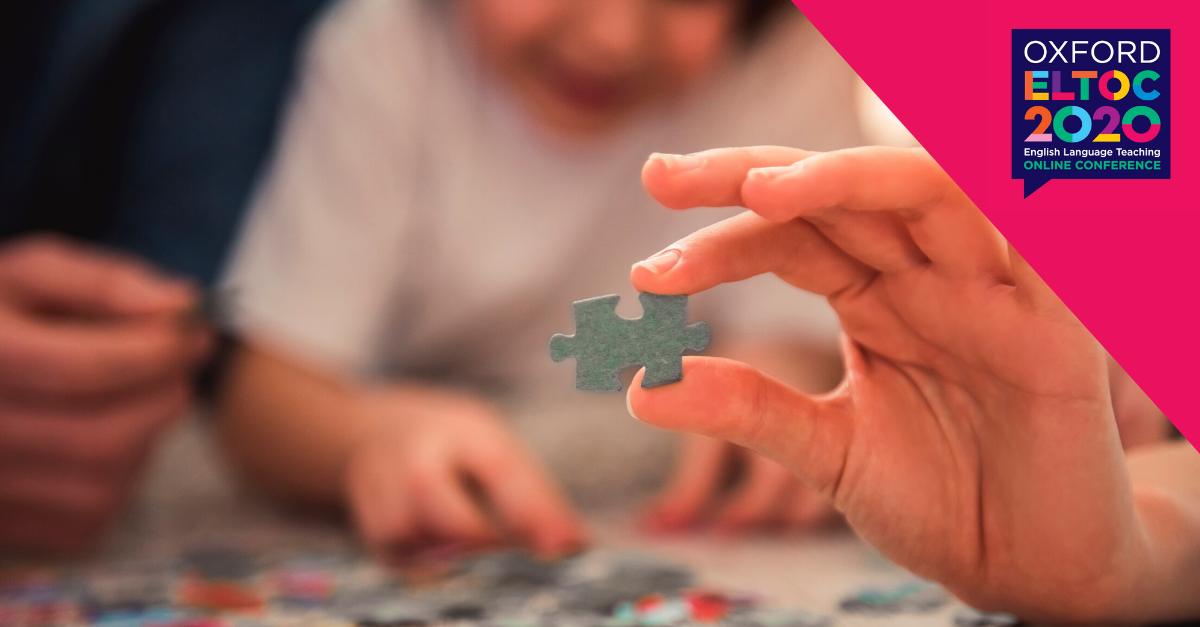 We all want our students to develop the global skills needed for modern life and work. We know that our teaching style, our classroom organisation, and what we expect of our students are critical in this. If we want our students to be collaborative and creative we have to provide opportunities for cooperation and problem-solving. However, any attempt to assess these skills raises ‘why?’ and ‘how?’ questions. During my session at ELTOC 2020, I will seek to answer some of these. In the meantime, here’s a brief summary of my approach:
We all want our students to develop the global skills needed for modern life and work. We know that our teaching style, our classroom organisation, and what we expect of our students are critical in this. If we want our students to be collaborative and creative we have to provide opportunities for cooperation and problem-solving. However, any attempt to assess these skills raises ‘why?’ and ‘how?’ questions. During my session at ELTOC 2020, I will seek to answer some of these. In the meantime, here’s a brief summary of my approach:
Why do we need to assess this kind of learning?
- To signal its importance in the modern world. Language learning cannot be separated from functioning effectively in society. Global skills encourage sensitivity to the needs of others, problem-solving, and how to communicate effectively with those from different cultures. Assessing global skills shows we value them.
- To convince students, particularly those driven by external rewards, that these skills are important and should be attended to.
- Because their assessment helps students know how well they are doing in these skills. It becomes the basis of feedback to students on how well they are doing and what they need to do next to improve.
How do we assess global skills?
Global skills are broad and complex so we need to assess them in ways that do justice to this. If we want to capture performance in a global skill, some conventional assessment methods might not be fit-for-purpose. A multiple-choice test assessing creativity (and there have been some) won’t capture what is important. Nor would giving a mark for social responsibility and well-being be appropriate.
Instead, we will need to use more informal ways of gathering evidence to make more general holistic judgements about progress. These are the result of regular observations of student performance and continuous monitoring of their progress. This does not involve lots of extra record-keeping by teachers, it relies on their professional skills of both knowing what the skills involve and informally monitoring individuals’ performance.
As part of our students’ development of global skills, we can put the responsibility for gathering evidence of performance on the students. What can they claim they have done to demonstrate a particular cluster of skills? Can they provide evidence of, for example, creativity and communication? The very act of doing this may be evidence of emotional self-regulation and wellbeing.
One of the best ways of capturing their achievements is for students to develop individual portfolios. These can be electronic, paper-based, or a blend of both. The aim is to demonstrate their development in each of the global skill clusters. The teacher’s role is to judge, along with their own observations, the student’s progress in skill development. This then provides an opportunity for feedback on where a student has reached and what steps could be taken to progress further.
How should we approach this more holistic approach to the assessment of global skills?
1) Keep it simple
Our suggestion[i] is that we use just three classifications for each cluster of skills: working towards; achieved; exceeded. Each of these may generate specific feedback – what more is needed; where to go next; how to improve even further.
2) Trust teacher judgement
The evidence for these holistic judgements comes from the teacher’s own informal evaluation of what is seen, heard and read in the classroom and outside. This is more dependable than narrow standardised skills because of the multiple and continuous opportunities for information gathering. These judgements require teachers to utilise and develop their skills of observation and continuous assessment.
3)Continuously sample student performance
This does not mean informally assessing every student on every occasion, it involves focusing on different students on different occasions so that, over time, we will have monitored all our students’ performance.
4) Use any assessments formatively
The purpose of the assessments is to inform students of their performance and to use our judgements to provide feedback on what to do next. The classifications should be used to encourage further development rather than as summative grades.
Gordon spoke further on this topic at ELTOC 2020. Stay tuned to our Facebook and Twitter pages for more information about upcoming professional development events from Oxford University Press.
You can catch up on past Professional Development events using our webinar library.
These resources are available via the Oxford Teacher’s Club.
Not a member? Registering is quick and easy to do, and it gives you access to a wealth of teaching resources.
Gordon Stobart is Emeritus Professor of Education at the Institute of Education, University College London, and an honorary research fellow at the University of Oxford. Having worked as a secondary school teacher and an educational psychologist, he spent twenty years as a senior policy researcher. He was a founder member of the Assessment Reform Group, which has promoted assessment for learning internationally. Gordon is the lead author of our Assessment for Learning Position Paper.
[i] ELT Expert Panel (2019) Global Skills: Creating Empowered 21st Century Citizens Oxford University Press


[…] via How can we assess global skills? | ELTOC 2020 — Oxford University Press […]